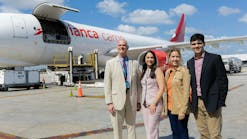Nov. 11--TAIPEI (THE CHINA POST/ANN) -- Taiwan and Japan on Thursday signed an open skies agreement hailed by both the tourism industry and academia as a new breakthrough in the relations between the two sides.
Signed by Taiwan's Association of East Asian Relations Chairman Peng Run-tsu and Japan Interchange Association Chairman Mitsuo Ohashi to deregulate air traffic between the two countries, the agreement allows an unlimited number of Taiwan and Japanese carriers to operate scheduled flights between the two countries and an unlimited number of flights between Taiwan and Japanese destinations outside of Tokyo, the Japanese capital.
Most importantly, the agreement gives each other the "beyond rights," also called the fifth freedom in International Law, which allows both Taiwan and Japanese airlines to carry passengers from either country to a second country, and from that country to a third country, and so on.
The exchange of instruments of ratification for a revision of the larger "Taiwan-Japanese Aviation Agreement" was completed Thursday with the open skies agreement incorporated into it.
In the future, there will be more flights to Tokyo. There will be two more passengers and four more cargo flights, operated by Taiwan carriers, from Taiwan to Tokyo weekly, while carriers from both sides will be allowed to operate seven night-time flights, which can be passenger flights or cargo flights, from Haneda Airport in Tokyo, Japan, to any Taiwan airport except the Songshan Airport in Taipei.
The agreement also lifts all restrictions on the number of carriers operating non-scheduled chartered flights, whether they carry passengers or freight, as well as the restrictions on the number such flights between the two countries.
In 2013, when the handling capacity of Tokyo's Narita Airport is expected to reach 270,000 flights, the current cap on the number of flights between Tokyo and various Taiwan airports will be scrapped.
A representative of the tourism industry in Taiwan was confident the agreement will usher in a triple-win situation for airlines, tourist agencies, and consumers, saying the airlines and tourism industry of both countries can make the markets larger under the "open skies."
Airfare will become more reasonable, and tourists will have a greater variety of products to choose from, Secretary-General of the Taiwan Federation of Tourist Industry Association Hsu Kao-ching said Thursday.
However, an executive of a travel agency was not so optimistic, saying the market was already saturated. Supply already exceeds the demand for flights between Taipei and Tokyo, CEO of Star Travel Corp. Lin Cheng-yeh said, adding, however, consumers could look forward to an era of cheap air tickets when competition would become even more intense.
A scholar, on the other hand, said the agreement made Taiwan and Japan closer partners. Bilateral relations have never been better since the severance of official ties between Taiwan and Japan in 1972, Professor Ho Szu-Shen at Fu Jen Catholic University's Department of Japanese told reporters Thursday.
According to Ho, the agreement also represents a Japanese effort to revive its tourist industry after a sharp decline in the number of foreign visitors in the aftermath of its earthquakes and tsunamis last March.
Copyright 2011 - The China Post, Taipei, Taiwan / Asia News Network




